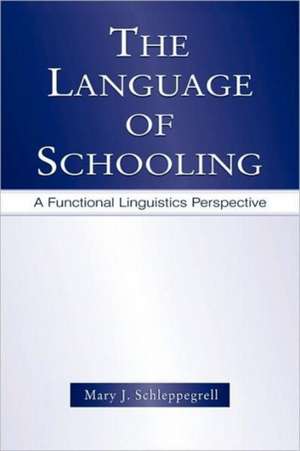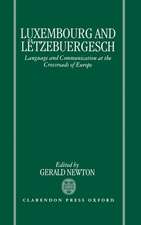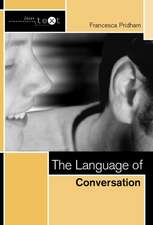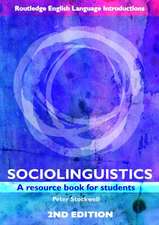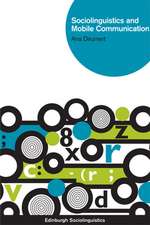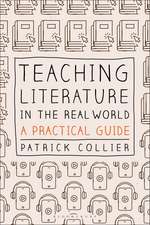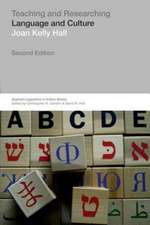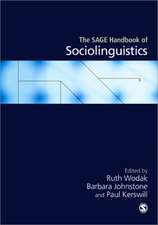The Language of Schooling: A Functional Linguistics Perspective
Autor Mary J. Schleppegrellen Limba Engleză Paperback – 19 mar 2004
| Toate formatele și edițiile | Preț | Express |
|---|---|---|
| Paperback (1) | 395.67 lei 6-8 săpt. | |
| Taylor & Francis – 19 mar 2004 | 395.67 lei 6-8 săpt. | |
| Hardback (1) | 998.71 lei 6-8 săpt. | |
| Taylor & Francis – 25 mar 2004 | 998.71 lei 6-8 săpt. |
Preț: 395.67 lei
Nou
75.74€ • 82.29$ • 63.66£
Carte tipărită la comandă
Livrare economică 21 aprilie-05 mai
Specificații
ISBN-10: 0805846778
Pagini: 204
Ilustrații: black & white illustrations
Dimensiuni: 152 x 229 x 12 mm
Greutate: 0.29 kg
Ediția:New.
Editura: Taylor & Francis
Colecția Routledge
Locul publicării:Oxford, United Kingdom
Public țintă
ProfessionalCuprins
Contents: Preface. Characterizing the Language of Schooling. Language and Context. Linguistic Features of Academic Registers. Writing School Genres. Functional Grammar in School Subjects. Language Development in School.
Recenzii
—Language Arts
"At present, there is no other book that could replace this book. Every teacher and researcher writing about the topic of language of schooling should own or read a copy of this book. It is especially important that all language teachers in particular and educators in general read this book in order to learn more of how language can be effectively taught for better success of students in all the school subjects. Surely, reading this book will help educators to be more efficient in their profession."
—TESL-EJ
" This book provides a clear and accessible introduction to issues of language in education and academic language in particular. The book integrates the most relevant literature on these topics and interprets it form a functional perspective that highlights the important of language in learning. It is a useful resource for teacher education and educational researchers. It is also a great introduction into Systemic Functional Linguistics for those who are not familiar with it."
—Journal of Language Identity, and Education
"The best introduction to the nature of academic language and its role in schools to date....The Language of Schooling deals with an important and cutting-edge topic in a very accessible way."
—James Gee
University of Wisconsin-Madison
"Schleppegrell examines both student and textbook writing in secondary schools and provides an integrated examination of grammar and discourse from a functional perspective. The treatment of the topic is insightful and the implications for teaching literacy...are apt and timely."
—Juliet Langman
University of Texas at San Antonio
Descriere
This book is about how language is used in the context of schooling. It demonstrates that the variety of English expected at school differs from the interactional language that students use for social purposes outside of school, and provides a linguistic analysis of the challenges of the school curriculum, particularly for non-native speakers of English, speakers of non-standard dialects, and students who have little exposure to academic language outside of schools.
The Language of Schooling: A Functional Linguistics Perspective builds on current sociolinguistic and discourse-analytic studies of language in school, but adds a new dimension--the framework of functional linguistic analysis. This framework focuses not just on the structure of words and sentences, but on how texts are constructed--how particular grammatical choices create meanings in the different kinds of texts students are asked to read and write at school.
The Language of Schooling: A Functional Linguistics Perspective
*provides a functional description of the kinds of texts students are expected to read and write at school;
*relates research from other sociolinguistic and language development perspectives to research from the systemic functional linguistics perspective;
*focuses on the increasing linguistic demands of contexts of advanced literacy (middle school through college);
*analyzes the genres typically encountered at school, with extensive description of the grammatical features of the expository essay, a gatekeeping genre for secondary school graduates;
*reviews the grammatical features of disciplinary genres in science and history; and
*argues for more explicit attention to language in teaching all subjects, with a particular focus on what is needed for the development of critical literacy.
This book will enable researchers and students of language in education to recognize how the grammatical and discourse features of the language of schooling construct the content areas, role relationships, and purposes and expectations of schools. It also will enable them to better understand the nature of language itself and how it emerges from and helps to maintain social structures and institutions, and to apply these understandings to creating classroom environments that build on the strengths students bring to school.
